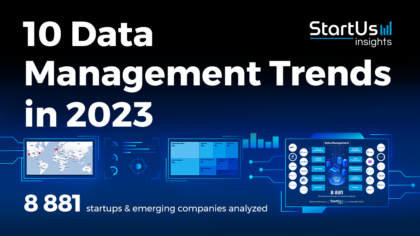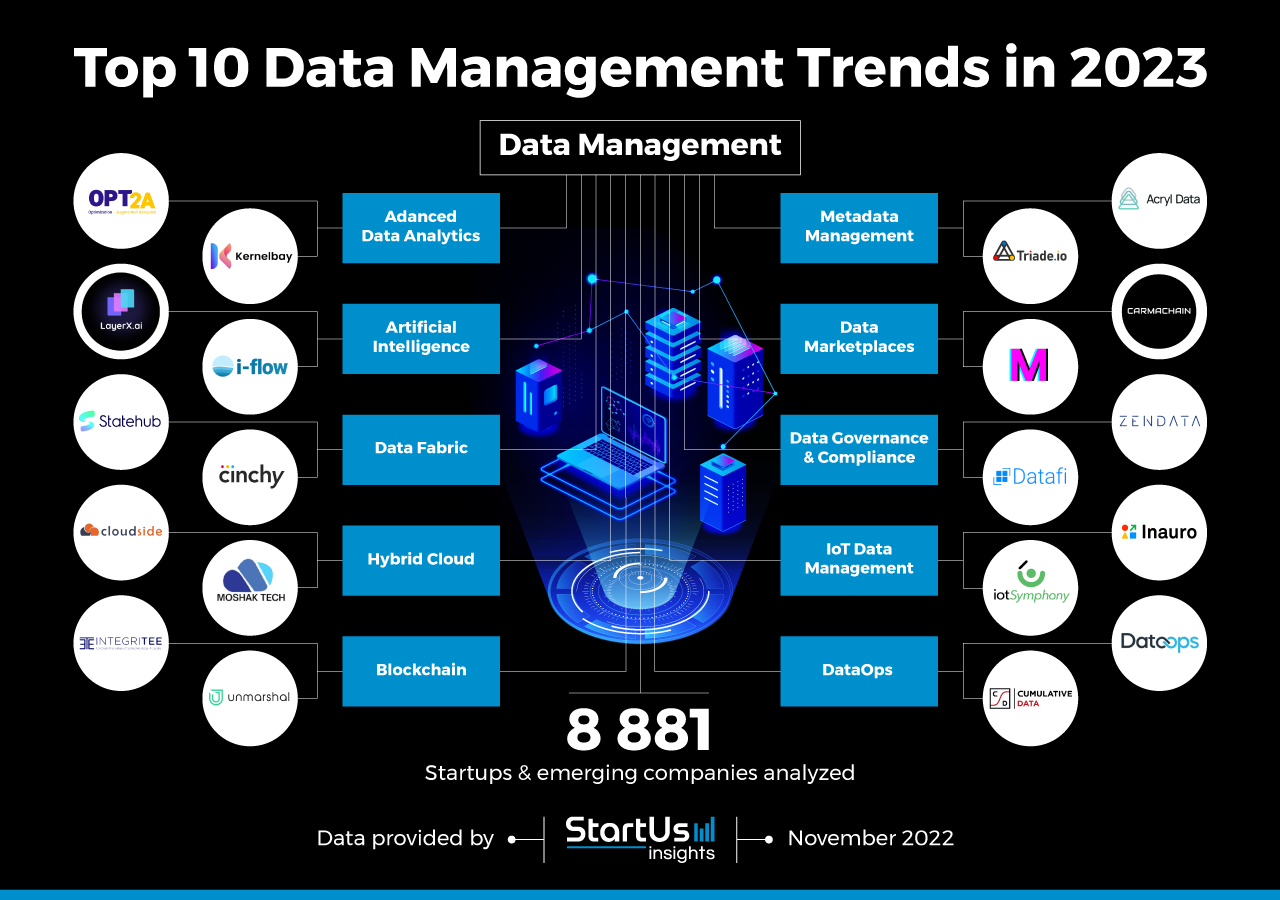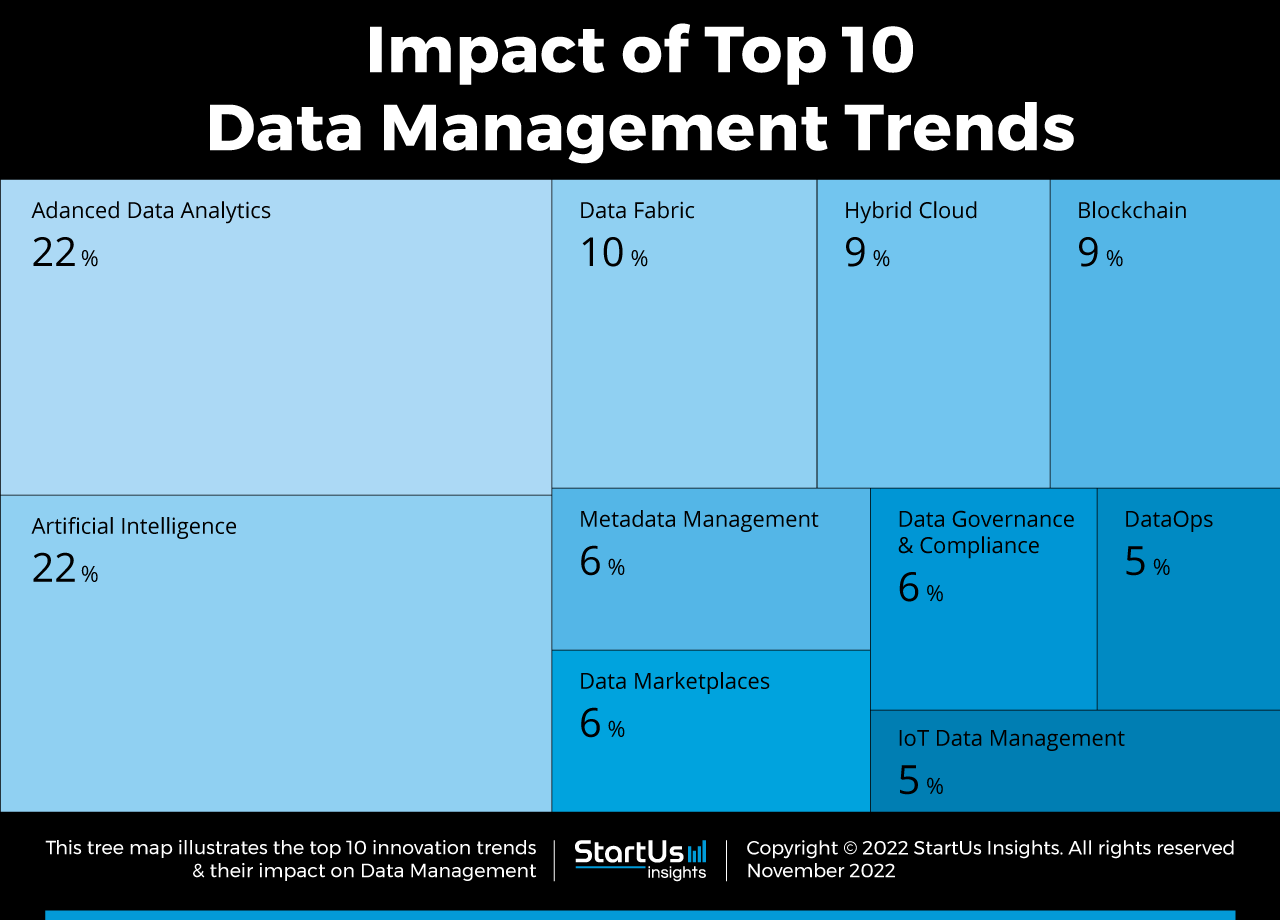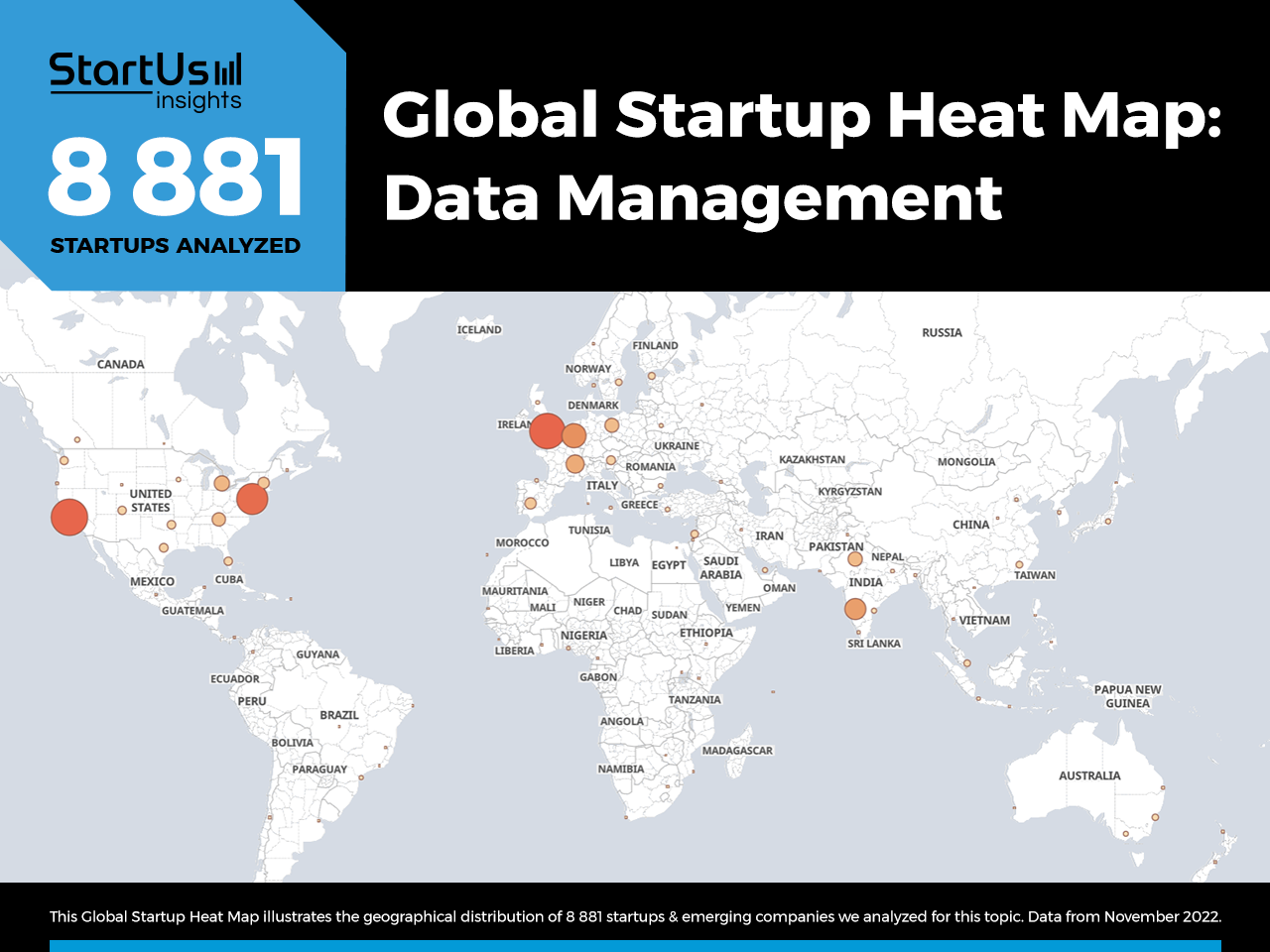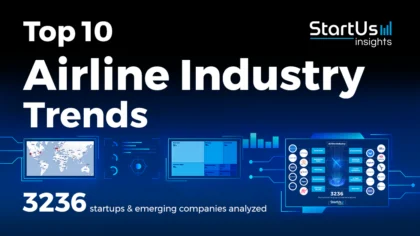Accelerate Productivity in 2025
Reignite Growth Despite the Global Slowdown
Companies from every industry are undergoing digital transformation and generating huge amounts of data. Therefore, it becomes necessary to optimize data management processes and make them cost-effective. Simultaneously, big data and analytics enable businesses to leverage their organizational data to make data-driven decisions and improve the end matrix. This report provides an overview of the top 10 data management trends and innovations in 2023 so that you do not miss emerging data management solutions. They range from hybrid clouds and artificial intelligence (AI) to blockchain and novel DataOps solutions. Read more to explore how they impact your business.
Innovation Map outlines the Top 10 Data Management Trends & 20 Promising Startups
For this in-depth research on the Top Data Management Trends & Startups, we analyzed a sample of 8 881 global startups & scaleups. The result of this research is data-driven innovation intelligence that improves strategic decision-making by giving you an overview of emerging technologies & startups in the data management sector. These insights are derived by working with our Big Data & Artificial Intelligence-powered StartUs Insights Discovery Platform, covering 2 500 000+ startups & scaleups globally. As the world’s largest resource for data on emerging companies, the SaaS platform enables you to identify relevant startups, emerging technologies & future industry trends quickly & exhaustively.
In the Innovation Map below, you get an overview of the Top 10 Data Management Trends & Innovations that impact 8 881 companies worldwide. Moreover, the Data Management Innovation Map reveals 20 hand-picked startups, all working on emerging technologies that advance their field.
Top 10 Data Management Trends
- Advanced Data Analytics
- Artificial intelligence
- Data Fabric
- Hybrid Cloud
- Blockchain
- Metadata Management
- Data Marketplaces
- Data Governance & Compliance
- IoT Data Management
- DataOps
Tree Map reveals the Impact of the Top 10 Data Management Trends
Based on the Data Management Innovation Map, the Tree Map below illustrates the impact of the Top 10 Data Management Trends in 2023. Startups and scaleups are developing solutions based on advanced data analytics, AI, and hybrid cloud to automate data storage, management, and analysis. More and more companies rely on predictive and prescriptive analytics to make business decisions, making historical operational data management necessary. As a result, data marketplaces are emerging where companies purchase industry-relevant data to solve business problems. Businesses are also leveraging blockchain and data governance policies to ensure the security of sensitive data. Lastly, data fabric, the internet of things (IoT) data management, and DataOps are gathering interest.
Global Startup Heat Map covers 8 881 Data Management Startups & Scaleups
The Global Startup Heat Map below highlights the global distribution of the 8 881 exemplary startups & scaleups that we analyzed for this research. Created through the StartUs Insights Discovery Platform, the Heat Map reveals that the UK & US see the most startup activity.
Below, you get to meet 20 out of these 8 881 promising startups & scaleups as well as the solutions they develop. These data management startups are hand-picked based on criteria such as founding year, location, funding raised, & more. Depending on your specific needs, your top picks might look entirely different.
Top 10 Data Management Innovation Trends for 2023
1. Advanced Data Analytics
Companies with large amounts of data assets look beyond traditional business intelligence (BI) to solve complex business problems. For this, companies utilize advanced data analytics solutions such as augmented analytics, B2B analytics tools, cloud analytics, and compostable data analytics. Such solutions allow organizations to gain more value out of data and integrate data-driven decision-making workflows. Startups build data analytics solutions using either descriptive, diagnostic, predictive, or prescriptive analytics based on application scenarios. For example, energy or asset life forecasting platform primarily utilize AI-driven predictive analytics.
Kernelbay delivers Human-Oriented Augmented Analytics
Kernelbay is a Cypriot startup that offers AI-powered augmented analytics on human behavior. The startup’s solution combines current environmental and historical data to conduct real-time data augmentation. Its machine learning algorithms then statistical methods predict are drawn from this data by running it through machine learning algorithms and statistical methods to predict customer actions. This allows real estate, retail, and eCommerce businesses to better understand customer preferences and enable data-driven decision-making.
OPT2A aids Data Mapping
OPT2A is a French startup that provides data mapping services for organizations. The startup applies optimization and augmented analytics to organizational data to improve workflows and key performance indicators (KPIs). Its tools also build automated scripts using input data and enable accurate forecasting, dynamic pricing, operational optimization, and more. This allows investment, real estate, e-learning, and software companies to better utilize their data and improve profits.
2. Artificial intelligence
With organizations generating huge amounts of data, it is challenging to streamline, structure, and clean data manually. AI and machine learning algorithms automate the management and cleaning of unstructured data. Enterprises integrate AI at different levels of data capture to automate the entire data management lifecycle from ingestion to curation and structuring. This way, AI in data management improves database queries, accuracy, and performance, and optimizes system resources.
LayerX.ai provides AI-based Data Management
LayerX.ai is a US-based startup that builds an AI-based data management platform. It allows users to build AI models to annotate and auto-label images and videos. Further, users are able to centrally manage the labeling datasets as well as test and deploy models at scale. Additionally, the platform comes with a built-in augmentation tool that enriches the datasets with similar images and increases the accuracy of the ML models. The platform thus simplifies data labeling and managing for businesses.
I-flow improves Factory Data Management
I-flow is a German startup that offers data management software to fetch and integrate data from several sources within factories. It integrates with existing edge servers to collect, organize, and process industrial IoT (IIoT) data from machines, systems, and sensors. Further, the software builds and implements AI models over a cloud environment to offer operational insights and make the processes more efficient. Thus, the startup simplifies data management for industries and allows them to quickly adopt various IIoT use cases.
3. Data Fabric
Data fabric is an architecture that integrates end-to-end data management capabilities while being independent of data environments, procedures, and usage. The automated discovery, governance, and consumption of data by data fabrics enable businesses to leverage data across value chains. Consequently, this approach eliminates organizational data silos and aids inter-team or inter-plant collaboration. Moreover, transitioning to data fabric allow companies to leverage near real-time data integration and dynamic data governance structures.
Statehub ensures Global Data Availability
Statehub is an Israeli startup that builds a managed Kubernetes (K8s) data fabric that ensures data availability on any cloud infrastructure in real-time. Once the data is synced with Statehub’s solution, App Warping, the data becomes portable and accessible from any location or even from different cloud infrastructures. It also adds a layer of protection and offers disaster recovery to businesses. This allows software companies and businesses to switch to a multi-region, multi-cloud model without having to make changes to their application configuration.
Clinchy develops a Dataware Platform
Clinchy is a Canadian startup that creates a Dataware platform to simplify and streamline data management and maintenance processes. It features a modern data architecture with a data fabric that connects data across all applications in one place. With the platform, organizations are able to collaborate in real time and mitigate risks of data fragmentation or siloes. Banking, retail, eCommerce, and telecom companies perform advanced analytics and business intelligence (BI) activities using Clinchy’s platform.
4. Hybrid Cloud
Organizations now utilize on-premise installations as well as public and private clouds for various data services. As a result, their management becomes challenging as each component has different levels of privacy requirements. Businesses benefit from greater flexibility by adopting a hybrid cloud strategy, where on-premises appears and functions like the public cloud but has an added layer of data security. With hybrid cloud solutions, organizations are able to move business-critical data and workloads to public cloud environments while keeping sensitive data on-premise. This ensures the security, control, and authority of sensitive data and allows companies to reduce their cloud costs.
Moshak Tech simplifies Cloud Data Management
Moshak Tech is an Indian startup that offers a product to enable enterprises to build their own hybrid and multi-cloud architecture. The startup’s software-as-a-service (SaaS) product utilizes AI to analyze multi-cloud or hybrid cloud environments to optimize cloud costs and automate service migration. It also recommends service packages based on the analysis. This allows companies to avoid the complexities involved in cloud migration.
Cloudside builds Customized Cloud-Native solutions
Cloudside is an Indian startup that provides cloud-native solutions for data migration. The startup provides support to companies adopting multi-cloud and hybrid cloud solutions and has expertise in cloud infrastructures such as GCP, AWS, and Azure. Further, the startup offers cloud data management solutions for cloud-native databases. This allows companies to develop custom data solutions and solve business problems.
5. Blockchain
Businesses need to utilize additional third-party over their data management solutions to mitigate cyber attacks and ensure data compliance. However, blockchain-powered data storage eliminates the need for such security solutions. Its distributed ledger technology allows businesses to generate assets as well as audit trails and transaction records with more security. Moreover, blockchain’s decentralized data storage greatly reduces the risks of data tampering, increasing authenticity and accuracy. This is primarily useful for financial and healthcare data where data alterations lead to capital and life loss.
Integritee advances Blockchain-driven Data Management
Integritee is a Swiss startup that offers a platform to develop decentralized data-driven products and services to protect sensitive personal and business data. It combines Polkadot blockchain and trusted execution environments (TEEs) to ensure a high level of confidentiality. The startup’s software development kit (SDK) also simplifies the trusted execution and remote attestation. Consequently, this enables businesses to query or process data in pre-agreed ways while ensuring a safe and decentralized ecosystem.
Unmarshal offers Blockchain Data Indexing
Unmarshal is an Indian startup that develops a product suite for personalized blockchain applications. It is a multi-chain data infrastructure that offers streamlined access to data on decentralized finance (DeFi), non-fungible tokens (NFT), metaverse, and web3. By using the startup’s application programming interfaces (APIs), DeFi and web3 developers are able to quickly fetch token asset, transaction, and token holder data, accelerating workflows.

6. Metadata Management
Manually managing the metadata of massive amounts of data created in organizational processes is time and resource-intensive. This, in turn, limits the performance of database queries and data analytics. Automated metadata management tools thus collect additional data in near real-time, eliminating inconsistencies and data silos. Moreover, this ensures better data quality and accelerates analytics workflows. Since metadata management tools automatically tag sensitive data, they improve regulatory compliance and mitigate flaws during data audits.
Acryl Data provides 360 degrees Metadata View
Acryl Data is a US-based startup that offers a contemporary data catalog based on an advanced metadata platform. The startup’s multi-cloud metadata management platform brings clarity to organizational data entities through a 360 degrees view of technical, operational, and business metadata. Users are also able to generate statistical inferences to better comprehend the datasets. This empowers developers and companies to maximize the value that they derive from their data.
Triade enables AI-driven Metadata Management
Triade is a US-based startup that makes an AI-powered metadata management solution. It accelerates enterprise data preparation and enterprise data catalogs. Additionally, the startup develops solutions for cloud integration, data security, and data engineering, among others. The startup’s metadata management solution improves data integration, quality, and governance.
7. Data Marketplaces
Data-driven business decisions benefit organizations as operational improvements and sales opportunities. However, they need access to large datasets of internal organizational and customer data to leverage analytics workflows. To improve data access, startups offer data marketplaces where businesses are able to monetize and access highly relevant data. This provides companies with diverse data sources and mitigates in-house data collection. Through such public and private-sourced data, they are able to increase analytics model performance, improve risk management, and generate new leads.
Carmachain builds a Decentralized Data Aggregator
Carmachain is a Nigerian startup that offers an alternative credit data marketplace platform for companies to access customer financial data. It provides digital lenders data related to transaction history, utility, telecom, and credit footprint of customers. This allows finance companies to offer loans to customers with no formal credit score at reasonable interest rates.
Muna offers a 2-sided Data Marketplace
Muna is a Finnish startup that builds a two-sided marketplace. It allows businesses to provide discounts and rewards to customers for sharing their personal data. The platform also enables customers to control and monitor data usage and stop data sharing as per their choice. This provides companies with access to high-quality data and reduces customer acquisition costs.
8. Data Governance & Compliance
Data from different organizational pipelines often lack quality and lead to inconsistent information, duplicates, blank fields, and common data errors. To tackle these issues, companies integrate data governance strategies throughout data lifecycles. Further, government authorities enforce regulations to ensure the safety of sensitive customer data. That is why data compliance management solutions are garnering interest in the data management sector. This enables businesses to protect their data from cyber-attacks and internal data alteration. Moreover, this allows them to avoid audit flaws and penalties.
Zendata aids Data Protection & Security
Zendata is a US-based startup that offers a data privacy compliance-as-a-service solution. The startup’s cloud data security platform allows companies to manage data and security with data mapping and cookie consent management tools. Solutions for enterprises include website scanners, privacy mappers, and code scanners as well as a privacy management solution for individual users.
Datafi ensures Cloud Security & Privacy
Datafi is a US-based startup that builds a cloud platform to simplify data enablement in a secured environment. The startup’s no-code technology platform integrates a wide range of data solutions such as data management and BI. It ensures data compliance via consistent attribute-based policies and data privacy controls. The startup thus expands organizational data capabilities and mitigates data silos.
9. IoT Data Management
The increasing number of connected devices across industrial and commercial sectors forces companies to utilize data management systems tailored for IoT devices. This way, organizations are able to separate other business data for critical workflows and create database queries for IoT data when required. Additionally, IoT deployments have different use cases and make IoT data management more complex. For instance, IoT devices in manufacturing track asset conditions whereas the healthcare sector’s IoT wearables monitor human vitals. To ensure streamlined management, startups develop solutions for specific IoT use cases.
Inauro makes a Data Fusion Platform
Inauro is an Australian startup that develops Perspio, a data fusion platform for real-time IoT data integration. It ingests, processes, and analyses data from all connected devices, third-party sources, and other in-house systems. The platform then uses machine learning and AI to offer contextual insights from the IoT data. It thus automates workflows and increases operational efficiency in construction, logistics, and other such industries.
IoTSymphony offers IoT Device Analytics
iotSymphony is a US-based startup that builds a platform to collect IoT device data and transforms it into actionable insights. It integrates all aspects of an IoT ecosystem from edge devices, gateways, cloud, AI, analytics, and operational systems in one platform. The platform allows enterprises to better manage their IoT data and generate relevant business insights.
10. DataOps
The control of data is with IT teams whereas the ones using business data to develop solutions and generate insights are distributed across organizational hierarchies. This causes delays in data project deliveries and significantly impacts productivity. On the other hand, DataOps unifies business processes and data technologies to improve data access across organizations and accelerate analytics workflows. This allows all stakeholders to quickly access data on demand and enables companies to enhance data performance and ensure better data insights, driving sales.
DataOps.live advances Data Cloud Automation
DataOps.live is a UK-based startup that provides solutions for the automation of development, testing, and deployment of the snowflake data cloud. The startup’s platform offers end-to-end orchestration, environment management, and testing in a single UI. This allows organizations to balance agility and data governance while benefiting from advanced analytics infrastructure.
Cumulative Data builds a DataOps & Automation Platform
Cumulative Data is a US-based startup that builds Trel, a DataOps platform to simplify complex data projects. It features a catalog-based dependency mechanism that strictly orchestrates data transformations using configurations, producing reliable data. The data catalog offers a central repository for organizational data, thus allowing companies to break down departmental silos.
Discover all Data Management Trends, Technologies & Startups
These data management trends bring necessary advances in handling, storing, and processing massive amounts of data being generated. The future of data management will see more solutions empowering decentralized and distributed data architectures. For example, data mesh is an emerging technology that enables decentralized management.
The Data Management Trends & Startups outlined in this report only scratch the surface of trends that we identified during our data-driven innovation & startup scouting process. Among others, distributed storage, hybrid environments, and cybersecurity will transform the sector as we know it today. Identifying new opportunities & emerging technologies to implement into your business goes a long way in gaining a competitive advantage. Get in touch to easily & exhaustively scout startups, technologies & trends that matter to you!
